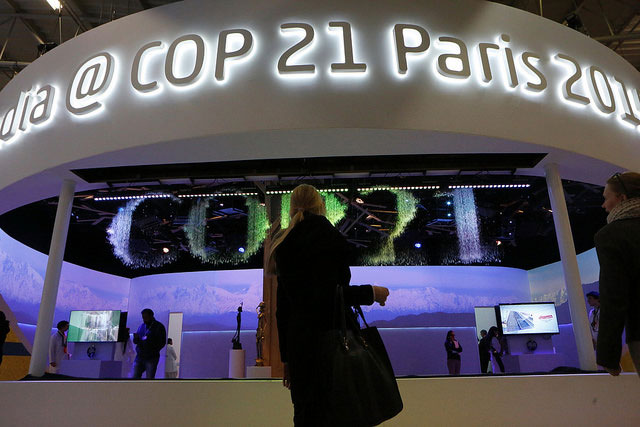
Part of the Series
Planet or Profit
On April 22 (Earth Day), US Secretary of State John Kerry, with his granddaughter in his lap, signed the international commitment that is supposed to slow the pace of anthropogenic climate disruption.
The commitment, which was the result of the 2015 Paris Climate Conference last fall, was signed by more than 150 countries at the UN. Its aim was to limit global temperature increases to between 1.5 and 2 degrees Celsius above preindustrial baseline levels.
The problem is, three days before Kerry made his symbolic signature, NASA released data showing that the first three months of 2016 are already nearing the lower limit of the Paris talks’ threshold, 1.5 degrees Celsius above preindustrial baseline temperatures.
Already Too Late?
By July 2015, the planet, already having been warmed by 1 degree Celsius over preindustrial temperature levels, was already halfway to the politically agreed upon goal of aiming to limit the global temperature increase to 2 degrees Celsius.
The same week world leaders recently gathered at the UN in New York to sign the international climate commitment, Gavin Schmidt, the head of NASA’s Goddard Institute of Space Studies, announced that the average global temperature for this year will likely range from 1.1 degrees to just below 1.5 degrees Celsius.
To see more stories like this, visit “Planet or Profit?”
Japan’s Meteorological Agency also reported that the first three months of this year were an average of 1.5 degrees Celsius above preindustrial baseline levels.
Fifteen of the 16 hottest years ever recorded have occurred since 2000, and NASA’s Schmidt said he is already “99 percent certain” that 2016 will be the warmest year ever recorded … again.
The past 12 months alone have shown unprecedented warming, as March 2016 was the 11th month in a row to have set a record for being the warmest of that specific month, ever.
There is no evidence to lead us to believe anything other than that these dramatic planetary warming trends will continue unabated.
As Truthout previously reported, a study published in Nature Climate Change showed that the planet is warming at a stunning rate: 50 times faster than when it came out of the most recent ice age. The implications of the rapidity of this warming, for those who care to digest it emotionally, are horrifying.
The study showed that even if carbon reduction targets are achieved and the planet’s temperature is kept below the warming threshold of 2 degrees Celsius, sea-level rise will still inundate major coastal cities around the world, forcing one-fifth of the world’s human population to migrate away from the coasts. New York, London, Rio de Janeiro, Jakarta, Cairo, Kolkata and Shanghai will all be underwater.
Then, according to recently released data from NASA, February 2016 was the warmest month ever measured globally, at 1.57 degrees Celsius above the preindustrial baseline temperature average.
Thus, stunningly, while it took from the advent of industrialization until October 2015 to increase the planetary temperature 1 degree Celsius, only four months later, the global temperature had risen an additional 0.57 degrees Celsius.
The Paris climate deal still has to be ratified by each of the signatory nations, and the ratification deadline is nearly a year away, on April 21, 2017.
Here in the US, in order to ratify the agreement, President Obama would likely have to use executive action in order to bypass a Republican Congress that remains skeptical of climate disruption, despite a nearly 100 percent scientific consensus on the matter.
Our most important fundraising appeal of the year
December is the most critical time of year for Truthout, because our nonprofit news is funded almost entirely by individual donations from readers like you. So before you navigate away, we ask that you take just a second to support Truthout with a tax-deductible donation.
This year is a little different. We are up against a far-reaching, wide-scale attack on press freedom coming from the Trump administration. 2025 was a year of frightening censorship, news industry corporate consolidation, and worsening financial conditions for progressive nonprofits across the board.
We can only resist Trump’s agenda by cultivating a strong base of support. The right-wing mediasphere is funded comfortably by billionaire owners and venture capitalist philanthropists. At Truthout, we have you.
We’ve set an ambitious target for our year-end campaign — a goal of $112,000 to keep up our fight against authoritarianism in 2026. Please take a meaningful action in this fight: make a one-time or monthly donation to Truthout before December 31. If you have the means, please dig deep.